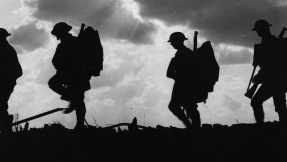Jacob’s Room: A Retrospective Look at Society Leading up to World War I
When I first read a work by Virginia Woolf, it felt like one, long, tedious experience—how interesting can it be to read about a mark on a wall?

I had no appreciation for her writing, and not knowing how significant of a literary figure she was, I forgot the name “Virginia Woolf” and hoped that I would never again encounter another story like that.
Last Fall, I saw her name listed as one of the writers whose works would be studied for a class, and thinking to myself that the name sounded familiar, I said to myself, Sure, Why not?
“The Mark on the Wall” had receded to the dark recesses of my mind by then, and it was not until halfway through the course—after reading Jacob’s Room and A Room of One’s Own—that I recognized the style of writing. I was thoroughly impressed by how realistic and vulnerable all of her characters were, and how capable Woolf was in taking a single moment or thought and expanding it over several pages.
Normally, I would have thrown it aside out of frustration, but the nuances of her characters’ thoughts made me feel as though I was not looking at contrived fictional characters, but REAL people. And before I knew it, I realized that the endless hours I had poured into reading her works was well worth the time.
This article is one of a series of three discussing Woolf’s novels, Jacob’s Room, Mrs. Dalloway, and To the Lighthouse, and her commentary on British society’s machinery. The form of my argument is comprised, as with my other articles, of close analyses of specific passages that reflect on Woolf’s broader messages.
Structure and Story
Perhaps the best way to describe Virginia Woolf’s Jacob’s Room is by referring to it as “a collection of moments.” It does not so much stream from one scene to the next in a seamless manner, but rather as each character makes his or her appearance, the narrator shifts her eyes and invests herself wholly to the character’s thoughts. However, this is not to say that the character she sees speaks a great deal, or even at all.

Instead, people brood silently over their own thoughts, even when they are surrounded by others. The combination of this with Woolf’s favoring of bits of reported dialogue over direct discourse results in a contemplative, fragmented novel whose purpose is to convey commentary on people’s relationships. However, while Woolf’s style of writing can garner appreciation, this does not mean that a person can pick up a book by her and “casually” read it. Each moment within her stories demands the reader’s utmost attention and critical judgment. Thus, in order to read Woolf, one must be willing to devote time to analyzing the implications of every little thought her characters have. And ultimately, one must accept that the world which Woolf’s characters inhabit serves to condemn and exonerate—seek closure yet be denied its finality.
Jacob’s Room is the chronicling of Jacob Flanders’ life, from the moment he is seen as a child climbing a rock on the beach, to the moment where he loses his life in World War I.
The Focus of Woolf’s Critique
Virginia Woolf’s depiction of society as systematic in its perpetuating of conformity and the notion of glorifying empire, serves to highlight her criticism of a government that leaves its people unprepared for reconciling death with the need to continue their lives. Woolf’s novel focuses on presenting the attitudes that facilitated England’s involvement in World War I, and the psychological consequences individuals suffered for the sake of propagating society’s machinery.

–Virginia Woolf
The notion of “society’s machinery,” as depicted in Woolf’s novels, is the idea that Woolf’s society is built on upholding certain beliefs that are systematically ingrained in its citizens, whether through institutionalized means or by conforming to the attitudes around them. In Jacob’s Room, Woolf comments on how men are taught to sacrifice their individuality, and to a certain extent their own humanity. In emphasizing the unnaturalness of supposedly natural institutions, Woolf targets society’s perception of women as inferior to men, the institutional manufacturing of young men into soon-to-be soldiers, and the perpetuating of an “unseizable force.”
Particularly, it is Woolf’s satirizing of society’s idealization of the notion of heroically dying for one’s country that allows the novel to portray how male youths are gradually dehumanized.
Presentation of Jacob and Perceptions of Women
In Jacob’s Room, Woolf’s decision to prevent the reader from having in-depth access to Jacob’s internal thoughts allows her to shape the reader’s perception of him solely based on the attitude he presents in his dialogues and the occasional terse thought. In Edward L. Bishop’s essay, “The Subject in Jacob’s Room,” the notion that Woolf purposefully chooses to depict Jacob as a “model” rather than a fleshed-out “character” is acknowledged: “he demonstrates an attitude much more than he expresses a feeling; he grows but does not change” (158).

As a result of using this method of portrayal, the only insight readers receive into his character leads them to view him as a misogynist—the stereotypical product of Woolf’s society’s expectations of men. An instance in the novel where this is shown is when Jacob is sitting in King’s College Chapel and comments on the presence of women in there with him: “a dog destroys the service completely. So do these women … For one thing, thought Jacob, they’re as ugly as sin” (Woolf, Jacob’s 31).
Jacob’s comparison of women to dogs naturally leads readers to view him in a negative light. Yet if the reader had greater access to his thoughts, one might observe why exactly he would ever think this way and perhaps even end up sympathizing with him. However, Woolf consciously keeps the reader at a distance from Jacob, for as Alex Zwerdling mentions in his essay regarding Woolf’s use of internal monologues in her writing, “The very use of internal monologue is a form of sympathy, if not of exoneration” (70).
It can thus be interpreted that Woolf does not want readers to sympathize with Jacob, but rather observe the things he says from a critical perspective and cast judgment on him; and since Jacob is a model for the kinds of men society creates, Woolf asks the reader to judge the standards of her society as a result. In observing Jacob’s thought about the women in the chapel, the reader perceives that society places an emphasis on excluding women from places that were generally set aside for men.
Kate Flint iterates this notion in her essay, “Revising Jacob’s Room: Virginia Woolf, Women, and Language,” in which she comments on Woolf’s intention to present Cambridge—the university all privileged male youths attend—as “a bastion of male social and educational privilege” (365). However, in order to convey the notion that it is not simply Jacob who views women in such a manner but rather that all men do, Woolf has Jacob interact briefly with Timmy Durrant who was in the chapel with him: “looked very sternly at him; and then, very solemnly, winked” (Jacob’s 31).

The fact that Woolf uses words like “sternly” and “solemnly” to describe Jacob’s exchange with Timmy reveals not only Jacob’s feelings that it is indeed a serious matter that women are in the same place as them, but the fact that he “winks” may imply that they are both “in” on the same shared sense of disquietude—that they both share the belief that women do not belong in the chapel with them. Thus, Woolf uses this moment to illustrate the misogynist attitude which society instills in men—an attitude that is systematically imposed on male youths as part of their education.
Education and Conformity
Perhaps one of the most striking scenes in Woolf’s novel that captures the notion that young men’s negative perception of women is a product of their education is when the narrator observes Jacob’s empty room: “on the table lay paper ruled with a red margin—an essay, no doubt—‘Does History consist of the Biographies of Great Men?’ There were books enough … but then anyone who’s worth anything reads just what he likes” (Jacob’s 37).
In this instance, the title of the essay connotes the mentality that men who arise out of Cambridge believe that men’s contributions to society are more significant than women’s, which is why society perpetuates the perception that women are inferior to men. The phrase “anyone who’s worth anything” suggests an air of snobbery, which, by having the narrator voice this mentality rather than having the men of Cambridge directly state it, it implies a tone of mockery; as though educated men frown on those who refer to others’ opinions in deciding what they ought and ought not to read; as though it undermines one’s masculinity to refer to others.
Thus, despite advocating the belief that one must not conform, the men who arise out of these educational institutions become the same regardless: all arrogant, self-assured of their own opinions, and condescending. As Bishop notes, “Jacob’s Room dramatizes how we exercise that reason within an envelope of ideology, how having been produced as subjects all that we will do is reproduce the prevailing system” (169). Thus, it is this superiority that society instills in men that leads them, according to Woolf, into catastrophic events: “These actions … are the strokes which oar the world forward … And they are dealt by men as smoothly sculptured as the impassive policeman … It is thus that we live, they say, driven by an unseizable force” (Jacob’s 164).

In this instance, the reference to the “unseizable force” implies that there is something about society’s machinery that makes war an inevitability. And not only that, but the novel goes so far as to say that society has devised these institutions for the primary purpose of preparing men for such situations: “At a given signal all the guns are trained on a target which … flames into splinters. With equal nonchalance a dozen young men in the prime of life descend with composed faces” (Woolf, Jacob’s 164). Woolf’s use of words like “trained,” “nonchalance,” and “composed” all imply the sense that young men are brought up to expect these things and are required to act without hesitation.
And since the narrator implies that all men who arise out of Cambridge are essentially “cookie-cutter versions” of each other, conformity is not a difficult thing to accomplish when they transition into the military. This is the reason why the depiction of men’s education plays such a big role in conveying Woolf’s commentary, as she uses it to expose the unnaturalness of supposedly natural institutions.
Ignorance is … not Bliss?
However, while the narrator of Jacob’s Room suggests that society’s traditions are responsible for fostering a kind of stoicism in young men, the novel also indicates an ignorance on the part of civilians in relation to this: “It’s not catastrophes, murders, deaths, diseases, that age and kill us; it’s the way people look and laugh, and run up the steps of omnibuses” (Woolf 84). In this instance the narrator portrays the members of society as completely unknowing of the impending war in a bitter tone.
Yet one may interpret the narrator’s bitterness not as anger towards the people but rather as pity. Since the narrator assumes a retrospective stance, she envies the people’s ability to seem so carefree. But it is for that same reason that she pities them, knowing full well that despite the preparation men undergo to give up their lives, society does not prepare people for the emotional consequences of losing their loved ones. Even when the narrator refers to “age” as not being the thing that kills people, she claims this is the case because the process of aging is inevitable and so people expect it.
If the narrator is not focusing on the physical effects when she refers to what kills us, then it is instead an emotional killing. Even the structure of Woolf’s novel lends itself to the idea that physical death is not the issue. After all, Woolf assigns Jacob with the surname of “Flanders”—the name of the region where many soldiers lost their lives in World War I—from the very beginning of the novel, asserting the notion that his fate to die in the war is inevitable, and yet not only is Jacob’s death never directly stated, but Woolf only spends hardly two pages of her novel when she implies it.

It is for this reason that Woolf refuses to romanticize Jacob’s death; the focus of Jacob’s Room is not to elegize the many youths who lost their lives in the war. She writes, “In any case life is but a procession of shadows, and God knows why it is that we embrace them so eagerly, and see them depart with such anguish, being shadows” (Woolf, Jacob’s 72-73). Instead, she seeks to criticize society for perpetuating an environment conducive to this kind of loss. As Tammy Clewell notes in her essay, “Consolation Refused: Virginia Woolf, The Great War, And Modernist Mourning,” Woolf’s novel focuses on idealizations that “show how prewar constructions of masculinity prepared the way for intolerable loss” (203).
Therefore, Jacob’s Room serves as a condemnation of Woolf’s society through her portrayal of Jacob as a misogynist. Woolf’s novel illustrates the “unnaturalness” of supposedly “natural” educational institutions in perpetuating conformity, the belief of men as superior to women, the submissiveness of men when it comes to the glorifying of empire, and the carefree naivety of British citizens to society’s machinery. All of these features of Woolf’s novel serve to show how society’s standards facilitated people’s involvement in World War I, and how unprepared society left its citizens for the painful losses they would experience.
Works Cited
Bishop, Edward L. “The Subject In Jacob’s Room.” MFS: Modern Fiction Studies 38.1 (1992) 147-175. MLA International Bibliography. Web. 10 Mar. 2014.
Clewell, Tammy. “Consolation Refused: Virginia Woolf, The Great War, And Modernist Mourning.” MFS: Modern Fiction Studies 50.1 (2004): 197-223. MLA International Bibliography. Web. 26 Mar. 2014.
Flint, Kate. “Revising Jacob’s Room: Virginia Woolf, Women, And Language.” Review of English Studies: A Quarterly Journal of English Literature And The English Language 42.167 (1991): 361-379. MLA International Bibliography. Web. 10 Mar. 2014.
Woolf, Virginia. Jacob’s Room. New York: Harcourt Inc., 2008. Print.
Zwerdling, Alex. “Mrs. Dalloway And The Social System.” PMLA: Publications Of The Modern Language Association of America 92.1 (1977): 69-82. MLA International Bibliography. Web. 26 Mar. 2014.
What do you think? Leave a comment.











Jacob’s Room isn’t really her best work, but it is interesting to read and see where she started from. And parts of it are truly beautiful, prose-wise.
If you want the true Woolfian novel in all its brilliance and beauty, read ‘To the Lighthouse’.
I believe both have a lot to offer. Jacob’s Room was the first book she ever had published (in addition to, if I remember correctly, two novels she had written prior but didn’t have published); if you prefer her later works, that’s not out of the ordinary as most writers tend to get better with time. Thanks for the read though!
I avoided Woolf for years because we spent entirely too much time together those last few months of grad school. I finished my thesis, put it in a box, and never wanted to see any of that stuff again. I suspect that’s not uncommon.
If you’re only reading one author’s works for an extended period of time, and being made to write essays on him or her, then that’s totally understandable. It can be a pain, but that still doesn’t take away from the appreciation the works merit. Thanks for the read!
Not as good as “To the Lighthouse”, which is pretty much like quibbling over the comparative value of gold and diamonds.
Both are great in their own right 🙂
Maybe I wasn’t in the mood for artsy literary style, but I could not get interested in this one in the first twenty pages, and had to put it down. I will let my guilt over that fester for a while and try again, but I am not holding out much hope that it will somehow be better the second time.
No need to force yourself. All literary works are subjective experiences for the reader–so it might just not be the kind of writing you enjoy. I personally didn’t read Woolf because I “enjoyed” reading her stories, I only read them because I had to for a class. I just have an appreciation for it now because she has a very unique writing style that conveys her thoughts exceptionally well. As a side note, I love to read Cormac McCarthy, so, to each his own. Thanks for the read!
Although I am nearly obsessed with Virginia’s work, this book only a thumbs up because she is so clever and poetic with words, not because this book, as a whole, was a great read. Sorry but that is how I felt.
That’s totally fine. I didn’t “love” it either. I just have an appreciation for her writing style. To each his own. Thanks for the read!
If this were published today, it would without doubt be nearly universally ignored, perhaps appearing as a cult eBook, struggling to keep above the waves of social media and blogs.
That’s possible; then again, there are a few brilliant writers who are still getting their works published today with fairly massive appeal. But their stories usually have well-developed plots in addition to deep messages, so I think I know where you’re coming from. Thanks for the read!
This woman blows me away again and again.
Agreed. She was pretty incredible at what she did
I’m a huge history buff. This was fascinating.
Much appreciated 🙂 thanks for the read!
This is amazing,I truelly enjoy reading this.
Woolf!s style of writing (shifting consciousness from one character to another at particular points) is almost uniquely hers. On the one hand, I can see that it can work well when executed well. On the other hand, there is the potential for imitators who more likely aren’t able to do this. When this happens, the result is confused literature.